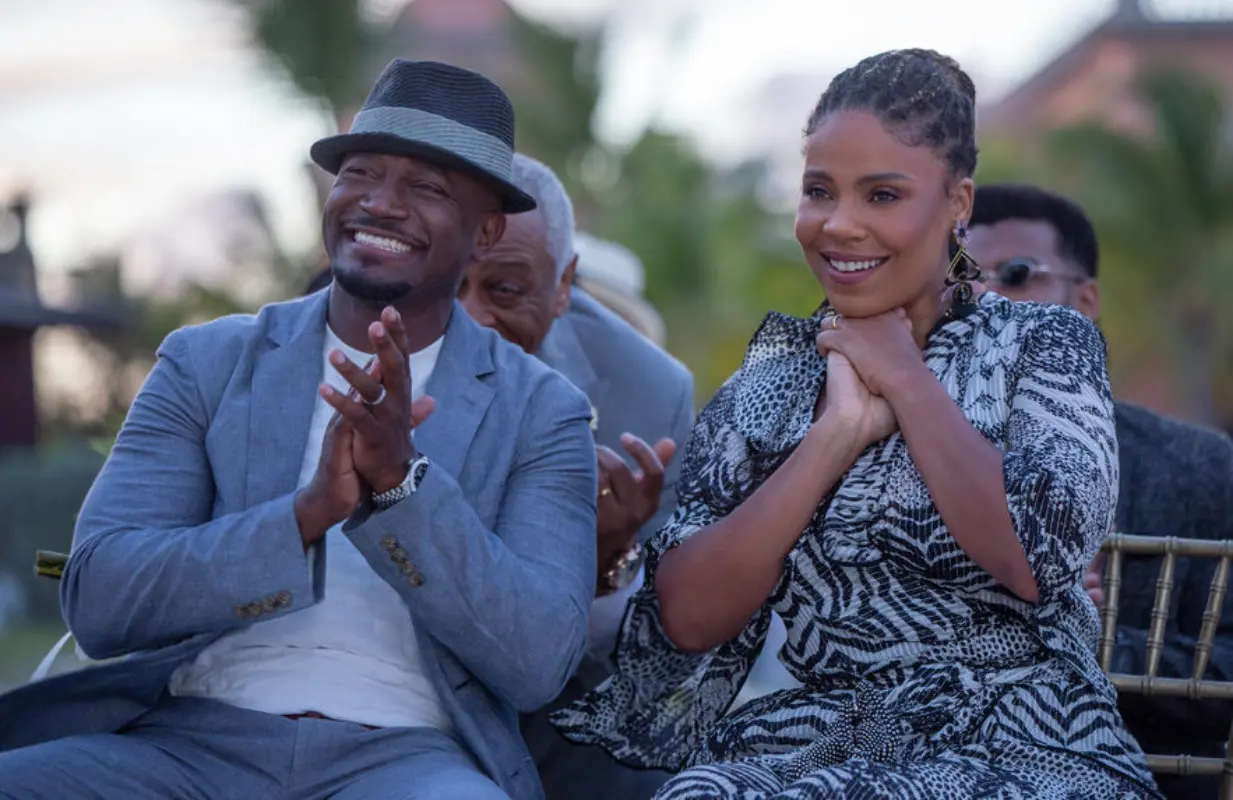The Best Man: The Final Chapters Is a Beautiful End for a Gen X Classic
-
 Taye Diggs and Sanaa Lathan in The Best Man: The Final Chapters (Photo: Nicolas Cordone/Peacock)
Taye Diggs and Sanaa Lathan in The Best Man: The Final Chapters (Photo: Nicolas Cordone/Peacock)Premiering December 22 on Peacock, The Best Man: The Final Chapters does more than revisit a group of beloved characters as they grapple with middle age. This limited series also extends one of Black cinema’s most enduring legacies.
Back in 1999, Malcolm Lee was only 29 years old when he wrote and directed The Best Man, a charming and romantic drama that follows college friends during the weekend before one of their buddies gets married. The film’s release was part of a ’90s renaissance in Black film that included Boyz n the Hood, Juice, Eve’s Bayou, Friday, and House Party. All these projects came from young writers and directors who wanted to expand the type of Black stories depicted on screen, and Lee was a conscious part of that movement. “When I wrote The Best Man, it was out of a desire to see myself,” he recently told TVLine. “Growing up I rarely saw Black people — Black men in particular — the way my friends and I saw ourselves: educated, upwardly mobile African-Americans who were just ‘normal.’”
This perspective helped The Best Man become a hit, as did the ensemble cast, which included Taye Diggs, Terrence Howard, Regina Hall, Sanaa Lathan, Melissa De Sousa, Harold Perrineau, Nia Long and Morris Chestnut. The film became such a Gen X touchstone that Lee reassembled the core performers for 2013’s The Best Man Holiday, and it earned more than triple its budget.
The Best Man: The Final Chapters picks up two years after that sequel, following the crew from 2015 to the present day. The eight-episode series finds Harper (Diggs) and Robyn (Lathan) raising their daughters in their Harlem brownstone. Shelby (Melissa De Sousa) is still bringing the drama as a reality star; Murch (Perrineau) and Candace (Hall) are still running their charter school; Jordan (Long) continues to climb the corporate ladder at MSNBC; and Lance (Chestnut) is still mourning the loss of his wife, Mia. The friends fly to the Caribbean to join Quentin (Howard) for his destination wedding, and things are peaceful enough until Harper drops the bomb that a movie studio has bought the rights to his novel, which is obviously based on his life. This opens up old wounds and grievances among the entire group.
In a wise move, Lee shares storytelling duties with Dayna Lynne North (Insecure), who serves as an executive producer and co-showrunner. North is one of several Black women on the project, and by adding their voices as producers, writers, and directors, the series is able to expand the female characters from archetypes into complex, three-dimensional human beings. Jordan, for instance, is still a hyper-independent, career-minded woman, but she also expresses vulnerability as she tries to balance the demands of her job and its effect on her physical and mental health. In a pleasant surprise, she also develops a closer bond with Shelby. The two might seem like night and day, but they are connected by their unapologetic ambition.
Robyn — whom the franchise has often reduced to a long-suffering girlfriend, wife, or mother — is finally given space to voice her own wants and needs, regardless of what Harper might think. Lathan is fantastic here, and her scenes with Diggs suggest she should’ve been doing more all along.
The male characters also deepen and grow. Quentin, the pretty boy womanizer who could barely hide his disdain for the opposite sex, finally matures. He’s running his father’s real estate empire, but he realizes he can’t run away from his need for stable companionship. The series also brings a long-overdue reckoning for Harper with a much closer look at how his ambition and selfishness have affected his friendships and his marriage.
Ultimately, all of the characters are forced to evolve as they approach middle age, and watching their journeys of discovery and acceptance will resonate with many Gen X viewers. This is the mark of the show’s success: Rather than working as pure fan service, it tells stories that push the characters forward, and the final episode especially offers satisfying, complicated resolutions to relationships that have been unfolding for decades. It’s a rich and fitting end to a beloved saga.
The Best Man: The Final Chapters premieres December 22 on Peacock. Join the discussion about the show in our forums.
Rebecca Theodore-Vachon is a tv and film critic whose work has been featured in Harpers Bazaar, Shondaland Magazine and Indiewire. Follow her on Twitter at FilmFatale_NYC.
TOPICS: The Best Man: The Final Chapters, Peacock, Dayna Lynne North, Harold Perrineau, Malcolm D. Lee, Melissa De Sousa, Morris Chestnut, Regina Hall, Sanaa Lathan, Taye Diggs, Terrence Howard